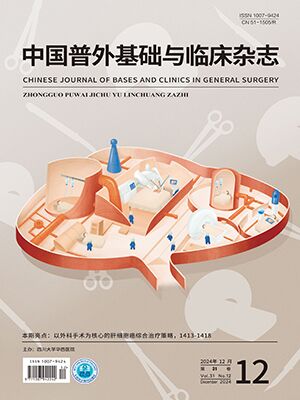Objective To validate the accuracy of the colorectal cancer model of the Association of Coloproctology of Great Britain and Ireland (ACPGBI-CCM), and to find out the relationship between clinical risk factors and the predictive value produced by ACPGBI-CCM.
Methods The patients diagnosed definitely as colorectal cancer in the department of anal-colorectal surgery, West China hospital from April 2007 to July 2007 were analyzed retrospectively. And the predictive value of mortality for each patient was calculated by ACPGBI-CCM, then the difference of risk factors was compared by classifying the patients into lower risk group and higher risk group by making the median predictive mortality as a cut point.
Results From April 2007 to July 2007, a total of 99 patients diagnosed definitely as colorectal cancer accepted treatment, and among which 67 patients included in this study were admitted whose average age was 60.09 years. And there were 34 male and 33 female patients; 15 right hemicolon cancer, 9 left hemicolon cancer, 43 rectal cancer; Dukes staging: A 0 case, B 37 cases, C 24 cases, D 6 cases. The observed mortality 30 days after operation was 0, whereas the predictive mortality was 0.77%-25.75% with a median value of 3.36%. Then the patients whose predictive mortality were ≤3.36% were grouped as lower risk group (34 cases), the others higher risk group (33 cases), and there was strikingly different predictive mortality between two groups 〔(8.86±4.51)% vs (1.76±0.68)%, P<0.01〕. And between two groups, the age, internal medicine complications, preoperative chemotherapy, ASA grading, cancer resected, and operative time made predominant differences (P<0.01); and the neoplastic complications, Dukes staging, TNM classification, postoperative pain showed differences, too (P<0.05); however, the gender, history of abdominal operation, the distance of the neoplasm to anal edge, the cancer location, differentiated degree, postoperative hospitalization time, and total hospitalization time didn’t have any differences (P gt;0.05). Furthermore, stratification analysis was made for risk factors, and it came out that there were great differences of predictive mortality for different age groups and ASA grading, having internal medicine complications or not, having chemotherapy or not, and for cancer resected or not, and the differences were statistically significant (P<0.01); also different Dukes staging or differentiation could cause different mortality (P<0.05); but the difference of mortality didn’t make any sense according to gender, having abdominal operative history or not, having neoplastic complications or not, different TNM staging and cancer location (P gt;0.05).
Conclusion The clinical applicability of the ACPGBI-CCM is ascertained in such a large volume single medical centre, but the ACPGBI-CCM overpredicts the mortality in this study which may be attributed to the different areas, nations, or the different cultures. The complications and the neo-adjuvant or adjuvant therapy are further found out that they may be independent predictive factors of survival, and more research will be needed to prove this.
Citation: CAO Lin,WANG Xiaodong,CHEN Shanshan,LI Li.. Preliminary Application of Colorectal Cancer Model of ACPGBI. CHINESE JOURNAL OF BASES AND CLINICS IN GENERAL SURGERY, 2008, 15(9): 646-651. doi: Copy
Copyright © the editorial department of CHINESE JOURNAL OF BASES AND CLINICS IN GENERAL SURGERY of West China Medical Publisher. All rights reserved




